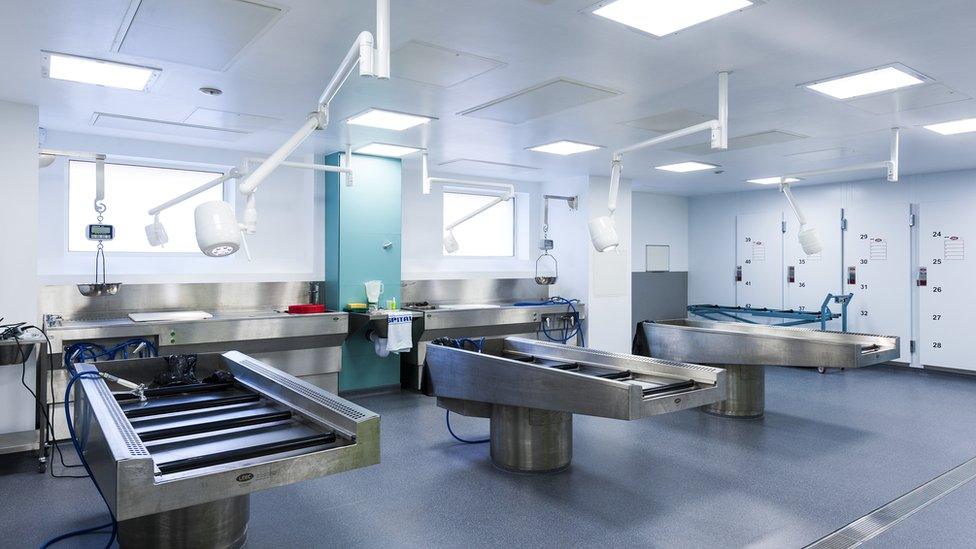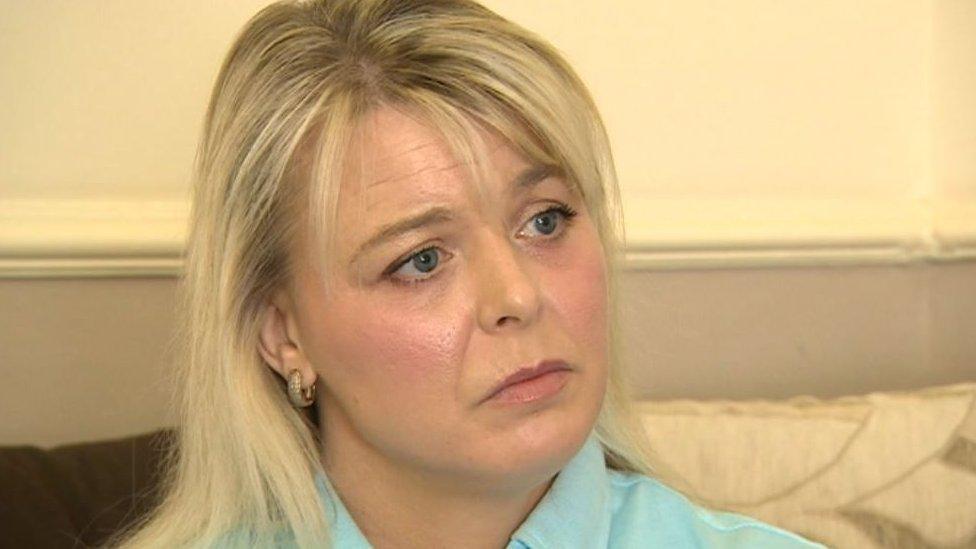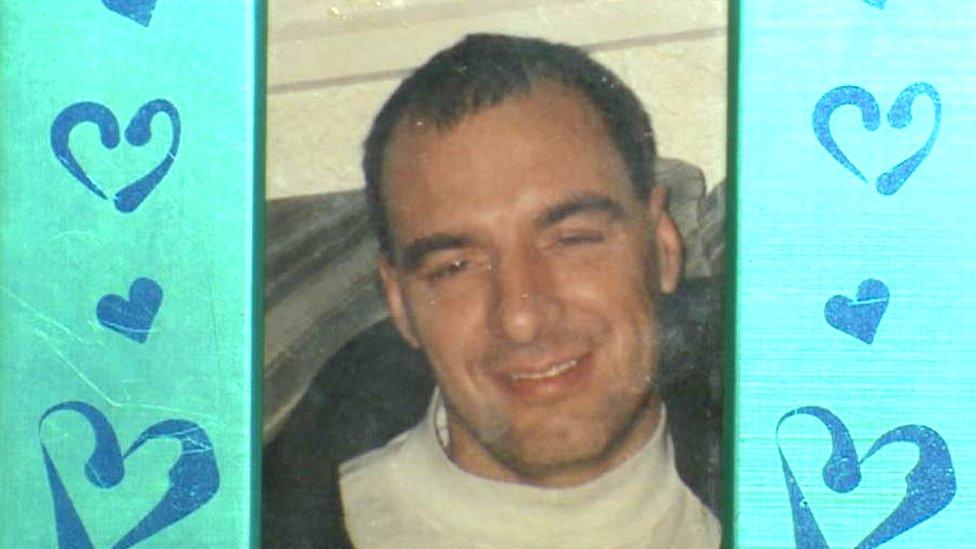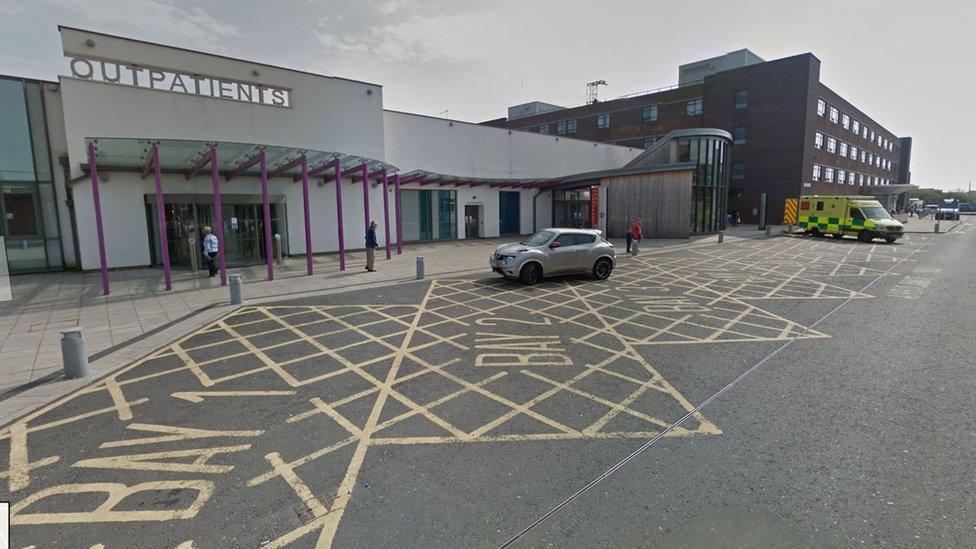Brain put in wrong body among mortuary failures
- Published

Bodies were accidently damaged 89 times in the last three years
A person's brain being found in the wrong corpse by an undertaker was among incidents reported by mortuaries from 2014 to 2016, a BBC Freedom of Information request has found.
There were 278 serious incidents in total in the three-year timespan in England, Wales and Northern Ireland.
Accidental damage to bodies was reported 89 times over that period.
The Human Tissue Authority (HTA) said that when incidents occur, thorough investigations are undertaken.
Wrong bodies released
Organs were discovered by hospitals after the rest of a body had been released to a family on 13 occasions, while the wrong body was released to families 36 times.
University Hospitals of Leicester NHS Trust recorded the largest number of incidents - 11 - over the three-year period.
During post-mortems, a deceased person's body is opened and the organs removed for examination.
The pathologist will return the organs to the body after the post-mortem has been completed, and tissue will generally only be retained where a death is suspicious.
The HTA defines a serious incident as "human errors or system failures that lead to damage to bodies or misplaced bodies or body parts".

Reportable incidents between 2014 and 2016
An undertaker discovered a brain in the abdominal cavity of a body which did not belong to it (Warwick Hospital)
Human error resulted in a mix-up of brains (John Radcliffe Hospital, Oxford)
Memory stick containing unencrypted images from two post-mortem examinations was left on public transport (Newcastle Upon Tyne Hospitals NHS Foundation Trust)
A large corpse could not be removed from a mortuary freezer because of the way it had frozen (King's College Hospital, London)
Wrong body released and cremated (Southport & Formby District General Hospital)


Sarah Simpson said her father's brain was stored for 22 years after his death
Sarah Simpson found out that her father's brain and other parts were stored against family wishes for 22 years after his death at South Tyneside District Hospital.
"In March earlier this year, police knocked on my door, saying it's about my dad, Terry Simpson." she said.
"I said it can't be him as he has been dead for 22 years, and it must be about my brother, with the same name, who had died a few months earlier."
The police explained that her father's organs were at the hospital, and were about to be released, and talked to her about funeral options.

Terry Simpson was killed in a fall in 1995
"There had been no permission to take any body parts at any time. My dad believed in reincarnation.
"He used to say, you're not taking my eyes or anything because I don't know where I'm going afterwards'," she explained.
She said she had not been given any answers about why it had happened, and the incident had sent her family into panic.
"I've just had to have another funeral for my dad," she said.
South Tyneside NHS Foundation Trust's Medical Director Dr Shaz Wahid said: "We met with Ms Simpson in September 2017 to explain the conclusions of our internal review into the retention of forensic human tissue samples at South Tyneside District Hospital and the measures we have taken to prevent this from occurring again in the future.
"Once again, we apologise unreservedly to Ms Simpson and all the families involved for the undoubted distress this must have caused."
Rare events
Chris Birkett, director of regulation for the HTA, said: "Incidents such as these are distressing for the families of those involved and, although they are rare, should never happen.
"If an incident does happen, we work with the establishment to ensure that a thorough investigation is undertaken, that lessons are learned, and that improvements are made to mitigate the risks of similar incidents happening again."
He also said the number of incidents was small given the fact that 330,000 bodies enter the care of mortuaries in England and Wales annually.
Leicester's Hospitals said it dealt with a large number of bodies, as one of the biggest and busiest mortuaries in the UK, and had an excellent culture of reporting.
Oxford University Hospitals said the very regrettable mix-up of brains was because of a labelling error at the John Radcliffe during a specialist examination as part of the autopsy process, and that an external expert had reviewed its processes in response.
Newcastle Upon Tyne Hospitals NHS Foundation Trust said it had reported the data breach to the Information Commissioners Office and HTA, and that its guidelines had not been followed.
Kings College Hospital said that new procedures had been introduced after the freezer incident to stop the same thing happening again and it had informed and apologised to the family.
University Hospitals Coventry and Warwickshire NHS Trust said a full investigation had been undertaken into the error at Warwick Hospital and it was rectified immediately.
- Published10 April 2017
